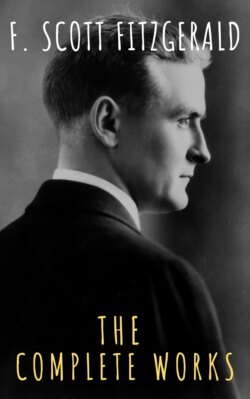Читать книгу The Complete Works of F. Scott Fitzgerald - F. Scott Fitzgerald, The griffin classics - Страница 164
IV
ОглавлениеWhen Jerry, the sallow, narrow-faced waiter, left Sylvester’s rooms he reported to the head-waiter, and then checked out for the day.
He took the subway south and alighting at Williams Street walked a few blocks and entered a billiard parlor.
An hour later he emerged with a cigarette drooping from his bloodless lips, and stood on the sidewalk as if hesitating before making a decision. He set off eastward.
As he reached a certain corner his gait suddenly increased and then quite as suddenly slackened. He seemed to want to pass by, yet some magnetic attraction was apparently exerted on him, for with a sudden face-about he turned in at the door of a cheap restaurant—half-cabaret, half chop-suey parlor—where a miscellaneous assortment gathered nightly.
Jerry found his way to a table situated in the darkest and most obscure corner. Seating himself with a contempt for his surroundings that betokened familiarity rather than superiority he ordered a glass of claret.
The evening had begun. A fat woman at the piano was expelling the last jauntiness from a hackneyed fox-trot, and a lean, dispirited male was assisting her with lean, dispirited notes from a violin. The attention of the patrons was directed at a dancer wearing soiled stockings and done largely in peroxide and rouge who was about to step upon a small platform, meanwhile exchanging pleasantries with a fat, eager person at the table beside her who was trying to capture her hand.
Over in the corner Jerry watched the two by the platform and, as he gazed, the ceiling seemed to fade out, the walls growing into tall buildings and the platform becoming the top of a Fifth Avenue bus on a breezy spring night three years ago. The fat, eager person disappeared, the short skirt of the dancer rolled down and the rouge faded from her cheeks—and he was beside her again in an old delirious ride, with the lights blinking kindly at them from the tall buildings beside and the voices of the street merging into a pleasant somnolent murmur around them.
“Jerry,” said the girl on top of the bus, “I’ve said that when you were gettin’ seventy-five I’d take a chance with you. But, Jerry, I can’t wait forever.”
Jerry watched several street numbers sail by before he answered.
“I don’t know what’s the matter,” he said helplessly, “they won’t raise me. If I can locate a new job——”
“You better hurry, Jerry,” said the girl; “I’m gettin’ sick of just livin’ along. If I can’t get married I got a couple of chances to work in a cabaret—get on the stage maybe.”
“You keep out of that,” said Jerry quickly. “There ain’t no need, if you just wait about another month or two.”
“I can’t wait forever, Jerry,” repeated the girl. “I’m tired of stayin’ poor alone.”
“It won’t be so long,” said Jerry clenching his free hand. “I can make it somewhere, if you’ll just wait.”
But the bus was fading out and the ceiling was taking shape and the murmur of the April streets was fading into the rasping whine of the violin—for that was all three years before and now he was sitting here.
The girl glanced up on the platform and exchanged a metallic impersonal smile with the dispirited violinist, and Jerry shrank farther back in his corner watching her with burning intensity.
“Your hands belong to anybody that wants them now,” he cried silently and bitterly. “I wasn’t man enough to keep you out of that—not man enough, by God, by God!”
But the girl by the door still toyed with the fat man’s clutching fingers as she waited for her time to dance.
